|
|
|
Sort Order |
|
|
|
Items / Page
|
|
|
|
|
|
|
| Srl | Item |
| 1 |
ID:
119196
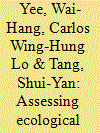

|
|
|
|
|
| Publication |
2013.
|
| Summary/Abstract |
This paper compares the key arguments of ecological modernization theory (EMT) with the reality of recent environmental reform in China. Based on data gathered from a survey and in-depth interviews with executives from Hong Kong-based enterprises operating in Guangdong province, we examine the changing roles of government, market, and civil society actors in the reform process, focusing on various types of pressures these actors have exerted on business enterprises. Compatible with Mol's (2006) conjectures, ecological concerns have gradually gained a foothold in existing political, economic, and to a lesser extent, social institutions. Yet, the relevant actors and their patterns of interactions differ from what EMT generalizes from Western European experiences. Specifically, local governments are assuming a more formalized relationship with firms in regulatory enforcement. Among market actors, organizational buyers along the supply chain have exerted more noticeable pressures on manufacturing firms than industrial associations and individual consumers. Civil society, while remaining less of an institutionalized actor in the environmental policy process, appears to pose a perceptible threat to at least some firms.
|
|
|
|
|
|
|
|
|
|
|
|
|
|
|
|
| 2 |
ID:
124674
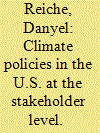

|
|
|
|
|
| Publication |
2013.
|
| Summary/Abstract |
This article analyzes how stakeholders are able to influence climate policy-making in the U.S.; emphasis is placed upon the most popular sports league in the United States, the National Football League (NFL). An empirical analysis of the 32 NFL franchises identifies pioneering clubs that have introduced ambitious green programs that include the utilization of renewable energies, the adoption of energy efficiency measures and carbon offsetting policies, as well as the facilitation of public transport and electric cars. Apart from environmental concerns, this paper identifies several drivers for pioneering actions: economic motives, pressure exerted by the local environment, public relations, and political incentives such as the promotion from the federal government's stimulus package. Finally, this article investigates the role that state actors, such as the Environmental Protection Agency, and non-state actors, such as the Natural Resources Defense Council, play in the innovation and diffusion processes of environmental programs in the NFL.
|
|
|
|
|
|
|
|
|
|
|
|
|
|
|
|
| 3 |
ID:
168646
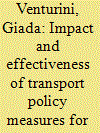

|
|
|
|
|
| Summary/Abstract |
The unsustainable growth in global transport activity is straining planet's resources and ecosystems. Hence, there is a need to promote technological developments, regulatory instruments and social changes to reduce the impact of mobility demand on energy use and environment. The current paper aims at assessing the impact and effectiveness of transport policy measures in reaching emission reduction targets for the case of the integrated energy and transport system of Denmark. Our analysis of policy scenarios is performed in collaboration with experts, stakeholders and citizens, and facilitated by a newly developed Scenario Interface tool linked to the energy system model TIMES-DK. Market signals, in the form of taxes on CO2 and fossil fuels, retain the highest impact in lowering the carbon emissions from the transport sector, while the promotion of Mobility-as-a-Service is the most cost-effective measure among those analysed. Finally, we discuss the implications of combining instruments into policy packages and emphasise the urgency of addressing technology and policy solutions for the maritime and aviation sectors.
|
|
|
|
|
|
|
|
|
|
|
|
|
|
|
|
| 4 |
ID:
142995
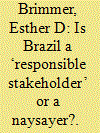

|
|
|
|
|
| Summary/Abstract |
This current order rests on promoting and maintaining five pillars: peace and security; the market economy, especially international trade and investment; human rights and humanitarian action; sustainable development; and global spaces. Each of these areas is large and complex, and the emergence of new powers is likely to alter that system but not destabilize it.
|
|
|
|
|
|
|
|
|
|
|
|
|
|
|
|
| 5 |
ID:
105437
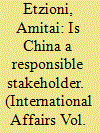

|
|
|
|
|
| Publication |
2011.
|
| Summary/Abstract |
Whether China is a responsible stakeholder is evaluated from employing three sets of standards: normative, 'aspirational' standards (i.e. those that make a good community member and an upstanding citizen); rational choice (is China acting in line with shared or complementary self-interest?); and power analysis (whether China is upsetting an established world order or contributing to the formation of a new one?). In the process, this article examines both China and the standards themselves.
|
|
|
|
|
|
|
|
|
|
|
|
|
|
|
|
| 6 |
ID:
088076


|
|
|
|
|
| Publication |
2009.
|
| Summary/Abstract |
During the past ten years there has been an increased willingness by international
health organizations to include multisectoral nonstate actors
in their decisionmaking processes. The stated aim of expanding multisectoral
involvement is to increase information flows from those on the ground,
to create a sense of policy ownership by those implementing various health programs,
to create a more unified front against global health priorities, and to
create a more robust sense of institutional legitimacy. One such institution has
been the Global Fund to Fight AIDS, Tuberculosis and Malaria, which was designed
specifically to bring various stakeholders together to create a more coordinated
mechanism to combat three of the world's most destructive diseases.
The purpose of this essay is to discuss the role of nonstate actors in the
decisionmaking processes of the Global Fund. The aim of this discussion is
not to undermine the good work of the Global Fund, but to expose certain
structural weaknesses in the current way nonstate actors are incorporated into
the governance process and to illustrate how these structural processes might
negate their effective participation. By doing so, this exploration will help expose
various deficit gaps between the stated aims of multisectoral participation
within the Global Fund and its actual practice. The goal is to encourage normative
recommendations for increasing the real-world operation of stakeholder
inclusiveness, ownership, partnership, and participation within the Global Fund.
|
|
|
|
|
|
|
|
|
|
|
|
|
|
|
|
| 7 |
ID:
187590


|
|
|
|
|
| Summary/Abstract |
Beyond the hitherto high cost of storage technologies, regulatory and market barriers such as lack of definition, double grid charges and unclear ownership rules have hindered their deployment. These barriers, however, have been largely overlooked in energy modelling research, calling for new interdisciplinary research. In 2019, the new EU electricity market directive was released with energy storage as a central element. Against this background, we study the impact of the new EU legal framework on the value of energy storage across 12 countries using techno-economic modelling informed by legal analysis and expert interviews. We conclude that the new legal regime fits for behind-the-meter batteries which could become widespread across Europe, considering their important value creation. This could also be the case for community storage, especially if national transpositions of the new legal regime prevent double grid charges or at least, moderate them. Legal certainty is created by prohibiting network operators to operate energy storage, but we argue that benefit stacking including applications which support electricity grids would only be possible if network operators set up transparent flexibility markets for the interested parties.
|
|
|
|
|
|
|
|
|
|
|
|
|
|
|
|
| 8 |
ID:
109472


|
|
|
|
|
| Publication |
2011.
|
| Summary/Abstract |
Over the past decades Vietnam has seen striking efforts to reinvent the exercise of democratic rural development. Promotion of grassroots democracy, notably under the Grassroots Democracy Decree (GDD), has been an acute response by Communist Party and government to large scale unrest among the rural populace owing to dissatisfactions with a felt mismatch between espoused commitments to 'good governance' and its actual practice. Through evidence from field work, this paper assesses the implications of the GDD in the central and northern highlands, analyzing how the promotion of grassroots democracy is discursively constructed by rural development professionals. The results outline three dominant discourses, which center on their respective interests in liberalist democratization, improved efficiency in state renovation, and enhanced accountability in governing local policy ambiguities. It argues that 'grassroots democracy' is serving as a conceptual mediator, supporting learning between diverging interests associated with rural development and different ideological positions shrouding the notion of democracy itself. Yet, given the extent that discourses are reflective of how professionals relate to grassroots aspirations, grassroots movements, which originally ushered the Party and central government to pass the GDD, have a significant struggle ahead of them to affect concrete changes in professionals' practices.
|
|
|
|
|
|
|
|
|
|
|
|
|
|
|
|
| 9 |
ID:
113152
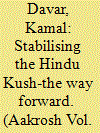

|
|
|
|
|
|
|
|